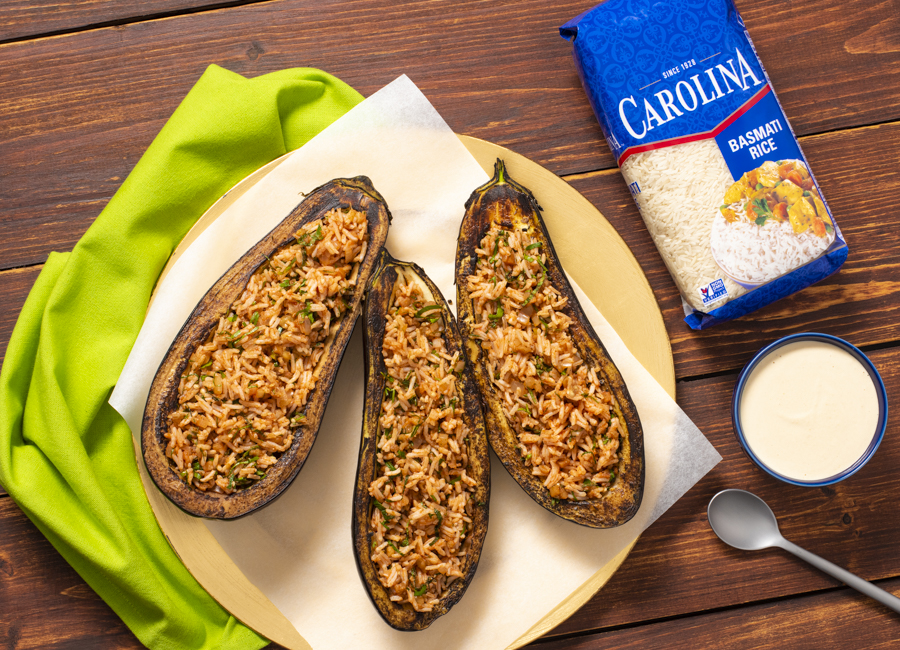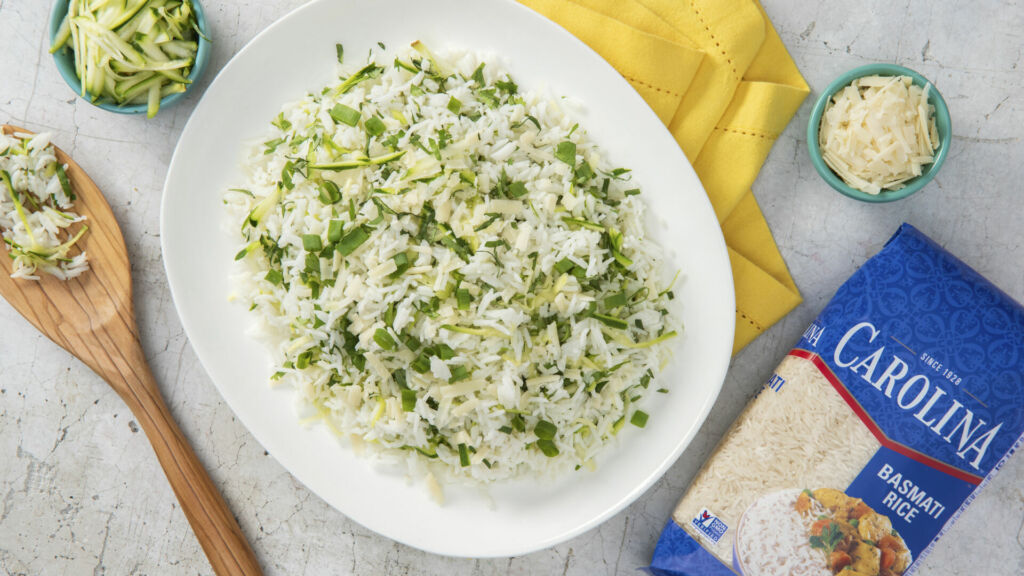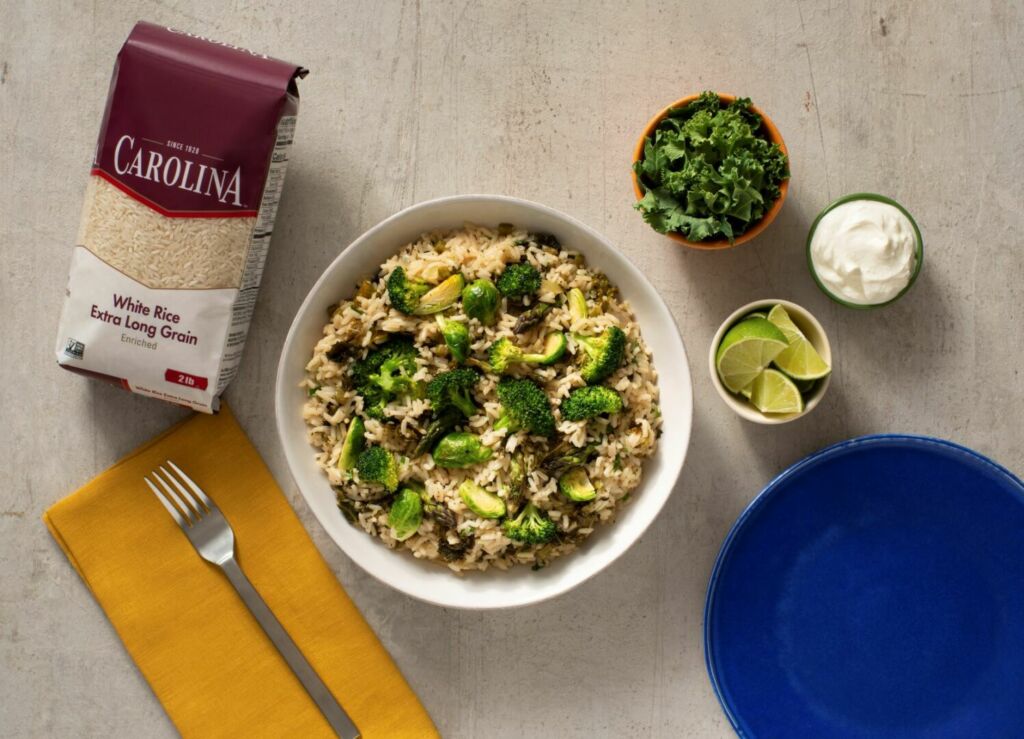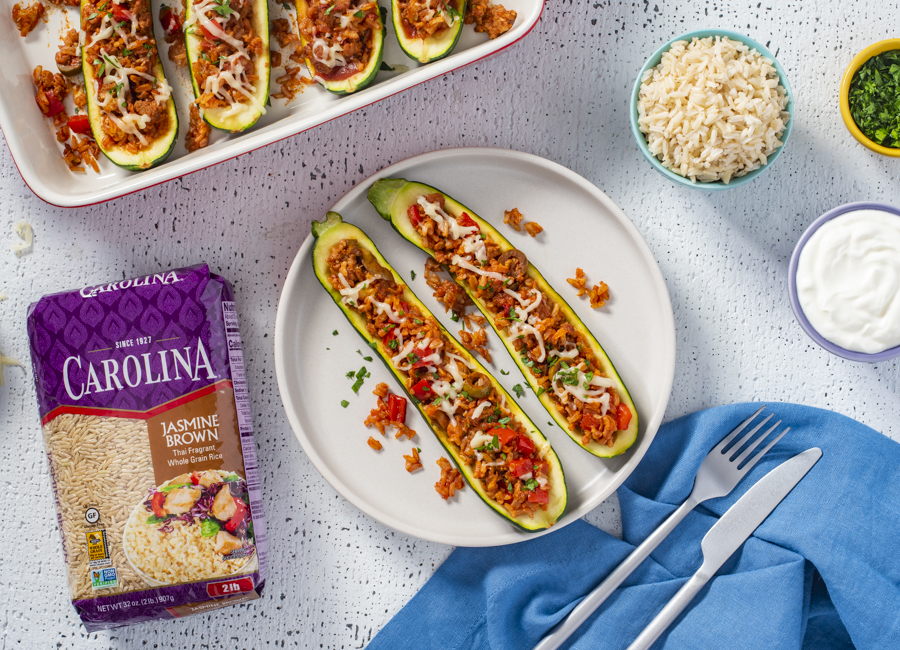Looking for ways to make the most of your summer meals? Then cooking with in season veggies is the way to go! That’s why Carolina® Rice is here to showcase the best of the summer harvest with these delicious recipes featuring eggplant, asparagus, and zucchini. So, without further ado, let’s dive into the wonderful world of seasonal cuisine!
Are Eggplants fruits or vegetables?
Most people consider eggplants to be vegetables because they are most commonly cooked in savory dishes and are rarely used in sweet desserts. Nevertheless, eggplants are technically classified as fruit, due to the fact that they have seeds and come from flowering plants. This is also the case with tomatoes and zucchinis. However, it’s also worth remembering that ‘vegetable’ is not a term used by botanists, rather it’s a culinary term which refers to how an ingredient is used in meals. This is why certain fruits such as eggplants, zucchinis, and tomatoes are often referred to as vegetables.
Easy Eggplant Recipe
Eggplant is an ingredient that truly shines when it takes center stage in a dish. In this Stuffed Eggplant with Rice and Tomatoes recipe, eggplant provides the base for a host of delicious ingredients. Stuffed with fragrant and fluffy Carolina® Basmati Rice, tomatoes, and spices, the flavor of the eggplant is particularly enhanced in baked vegetable recipes. Simply put, this recipe is a great way to usher in a new season of cooking!

Craveworthy Zucchini Recipes
Zucchinis are a mild-flavored ingredient that really come into their own in summer recipes. When cooked, they’re soft in texture and sweet to the taste, making them a versatile ingredient that works well with a variety of cooking techniques. In this recipe for Veggie Filled Rice Fritters, zucchini brings texture and flavor in abundance. Alternatively, If you’d like to try your hand at a recipe that puts zucchini front and center, why not have a go at these Zucchini Boats? Featuring Carolina® Brown Rice, savory Italian sausages, and fragrant herbs and spices, it’s a great way to unlock the flavor potential of zucchinis.
Using Raw Zucchini in Recipes
One of the many advantages of incorporating zucchini into recipes is that it tastes great in both its cooked and uncooked forms. Raw zucchini has a grassy, seed-like flavor, while in texture it’s crispy on the outside and spongy on the inside. For a fresh and fragrant rice dish using zucchini, try this Zucchini Rice recipe. Infused with herbs like cilantro and basil throughout, this simple rice dish is taken up a notch with the addition of shredded zucchini.

Cooking with Eggplant and Zucchini
Looking for a recipe that combines both of these delicious summer vegetables? Try this One Pot Ratatouille! Ratatouille has long been a staple of French cuisine, and it’s no wonder why. Packed with a range of delicious vegetables, it’s a versatile dish that’s particularly popular during summer and fall harvests.
Recipe with Asparagus
Asparagus shoots are known for their crisp texture and sweet and earthy flavor. They come into season in the spring and can be eaten fresh throughout the summer. But what’s the best way to use asparagus in your cooking? Well there’s a whole host of ways you can cook with asparagus, but it’s perhaps best used in roast vegetable recipes like this Green Rice with Roasted Veggies dish.

What vegetables are in season during summer?
If you’re looking for more delicious vegetables to cook with in summer, here’s an easy list featuring some of the stars of the summer harvest:
- Lettuce
- Beets
- Cucumber
- Corn
- Tomatoes
- Peas
- Baby potatoes
- Asparagus
- Zucchini
- Eggplant
Summer is also a wonderful time for salads. Up your salad game with our easy guide to Refreshing Rice Salads for Summer!
Why cook with seasonal vegetables?
Seasonal cooking sure has a lot of upside. Here are just some of the reasons why cooking in line with the harvest makes sense.
- Nutrients. Vegetables collected in season typically have more nutrients than those produced out of season. This is because they were left to ripen and mature in a natural way.
- Environment. Consuming in-season vegetables is also beneficial to the environment because they can be sourced locally.
- Cost. In-season veggies needn’t be frozen or preserved for extended periods of time before reaching our dinner tables. Nor do they require long-distance transportation, given that they are harvested locally. All of this makes seasonal veggies a more economical choice for consumers.
How to Select and Store Seasonal Summer Vegetables
- Choose small to medium-sized zucchinis for optimal tenderness and taste. Avoid big zucchinis, as they may be nasty. Zucchini can be kept in the refrigerator in a plastic bag for up to a week. To avoid premature spoilage, don’t wash them until just before you begin cooking.
- Choose firm eggplants with a good weight for their size. Avoid those with wrinkles or fragile skin. When storing eggplants, keep them cold and dry, away from direct sunlight. They can be kept in the fridge for up to a week.
- Asparagus should be kept in the refrigerator with the ends clipped and standing upright in a glass of water. Use them within a few days to ensure maximum flavor and freshness. Look for bright green, firm asparagus shoots with closed tips. Avoid any that appear wilted or emit a strong odor.
#Playwithyoufood this Summer Season
Summer is the perfect time of year to gather friends and family around you to enjoy some good food. Seasonal cooking has long been a part of our culinary heritage. Have fun with these seasonal summer recipes, and make sure to visit our blog for more useful tips and culinary inspiration.


